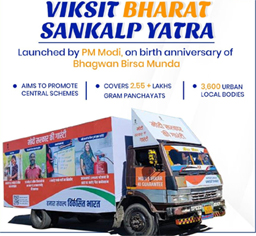Dr. Vivek Sharma
In the scenic landscapes of Jammu and Kashmir, where the struggles of everyday life are compounded by geographical challenges, the Ayushman Bharat “Pradhan Mantri Jan Arogya Yojana” (PMJAY) – SEHAT scheme emerges as a beacon of hope for countless individuals facing health-related adversities. The Viksit Bharat Sankalp Yatra, a monumental initiative aimed at ensuring 100 percent saturation of Government schemes, particularly highlights the transformative impact of ABPMJAY-SEHAT in the region.
Viksit Bharat Sankalp Yatra
The journey unfolds with poignant stories of individuals like Anchal Das and Abdul Razzaq Dar, who, amidst financial constraints and health challenges, found solace in the comprehensive health coverage provided by ABPMJAY-SEHAT. Anchal Das, a hardworking resident of Kathua, faced the daunting prospect of Ureter (PCNL) surgery, a financial burden that seemed insurmountable with his modest monthly income. However, the intervention of ABPMJAY-SEHAT proved to be a lifeline, offering him not just medical treatment but a renewed sense of hope.
Similarly, Abdul Razzaq Dar, a laborer whose knee pain had become a constant companion, found reprieve through Ayushman Bharat. With an annual income of Rs 50000, the cost of proper treatment was beyond his means. ABPMJAY-SEHAT stepped in, facilitating his admission to a private hospital, where he underwent a knee replacement surgery that would have otherwise been financially crippling.
At the heart of this transformative initiative lies the Ayushman Bharat “Pradhan Mantri Jan Arogya Yojana” (PMJAY) – SEHAT scheme, designed to provide financial protection from catastrophic health expenditures. Covering a wide array of medical and surgical conditions with minimal exclusions, the scheme offers a substantial Rs. 5 lakh cover per family per year. The inclusivity extends to both pre and post-hospitalization expenses, with coverage from day one for pre-existing conditions.
Post the abrogation of Article 370, the Central Government’s ABPMJAY-SEHAT scheme has played a pivotal role in reducing out-of-pocket expenditures and preventing financial bankruptcy for the underserved families of Jammu and Kashmir. The implementation of this cashless treatment facility has proven instrumental in alleviating the burden of severe and prolonged illnesses, ensuring that health care is not a luxury but a fundamental right.
The success of ABPMJAY-SEHAT is reflected in the statistics, with more than 83 lakh individuals in J&K being issued Golden cards, translating to nearly 24.68 lakh families benefitting from PMJAY-SEHAT coverage. The initiative has not only garnered praise for its impact but has also been recognized on a national level, with J&K securing the title of the best-performing Union Territory for enrolment under Ayushman Bharat PMJAY SEHAT.
The administration has gone the extra mile to facilitate the accessibility of Golden cards for citizens. A citizen-friendly online portal, setu.pmjay.gov.in, enables individuals to register and download their Golden cards, streamlining the process and ensuring that the benefits of the scheme reach every eligible individual.
The Viksit Bharat Sankalp Yatra, a monumental undertaking covering the Union Territory of Jammu and Kashmir, has emerged as a powerful catalyst in ensuring the saturation of Government schemes, particularly the Ayushman Bharat SEHAT Scheme. More than 3.5 million people across the UT have actively participated in the yatra, underscoring the significance of these initiatives in reaching the last person in the queue.
During the yatra, over 38 thousand Ayushman cards were issued, a testament to the commitment to achieving comprehensive coverage. The success stories shared by individuals like Shakeel Ahmed from Surankote and Sajid from Rajouri further illustrate the profound impact of the Ayushman Bharat SEHAT Scheme on the lives of the economically disadvantaged.
Shakeel Ahmed expresses gratitude for the pro-poor policies of the Modi Government, highlighting how the Ayushman card facilitated free treatment for his mother, a scenario that would have been financially daunting otherwise. Similarly, Sajid emphasizes the privilege the Ayushman Bharat SEHAT Scheme provides for economically challenged individuals, citing the example of his mother receiving free treatment for a gallbladder issue.
Ramesh Lal from Kathua adds his powerful testimony, emphasizing how the PMJAY-SEHAT card enabled his family to access free, quality healthcare that was previously financially unattainable. These narratives collectively paint a picture of a transformative initiative that is not merely a healthcare scheme but a lifeline for those who have long struggled with health-related challenges and financial constraints.
In conclusion, the Viksit Bharat Sankalp Yatra stands as a testament to the impactful strides made in healthcare accessibility through the Ayushman Bharat SEHAT Scheme. The convergence of Government efforts, proactive citizen engagement, and the success stories of individuals overcoming health adversities collectively underscore the significance of such initiatives in building a healthier and more equitable society. As the yatra continues to traverse the Union Territory, it leaves in its wake a trail of improved lives and a vision of a healthier, more prosperous future for the people of Jammu and Kashmir.


